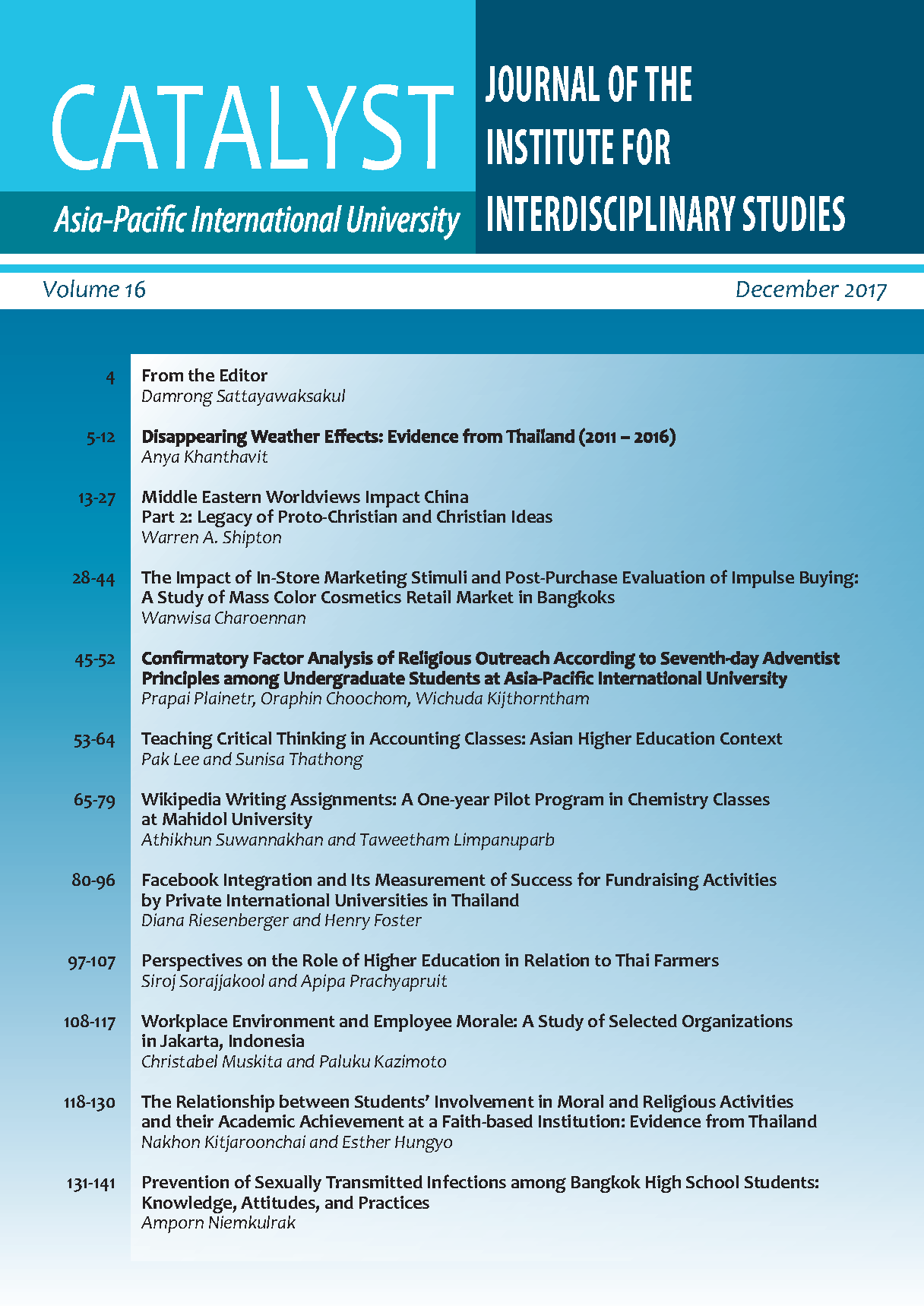Disappearing Weather Effects: Evidence from Thailand (2011 – 2016)
Main Article Content
Abstract
As the efficiency of the market improves, it is possible that weather effects cannot be detected by traditional, daily return tests. The effects may not exist at all, or they appear briefly but are traded against and disappear within the day. This study more closely examined weather effects, using intraday returns for the Thai stock market from 2011 to 2016, to identify the true cause of the disappearing effects in daily returns. It found no effects for the morning or afternoon trading sessions. Nor did it find any effects for the first and second fifteen minutes of the two sessions. The weather effects completely disappeared from the Thai stock market in recent years.
Article Details

This work is licensed under a Creative Commons Attribution-NonCommercial-NoDerivatives 4.0 International License.
Copyright: Asia-Pacific International University reserve exclusive rights to publish, reproduce and distribute the manuscript and all contents therein.
References
Chang, S., Chen, S., Chou, R. K., & Lin, Y. (2008). Weather and intraday patterns in stock returns and trading activity, Journal of Banking and Finance, 32(9), 1754-1766.
Doyle, J. R., & Chen, C. H. (2009). The wandering weekday effect in major stock markets. Journal of Banking and Finance, 33(1), 1388-1399.
Durbin, J. (1954). Errors in variables. Review of the International Statistical Institute, 22(1/3), 23-32.
Furhwirth, M., & Sogner, L. (2015). Weather and SAD related effects on the financial market. Quarterly Review of Economics and Finance, 57, 11-31.
Hansen, L. P. (1982). Large sample properties of generalized method of moments estimators. Econometrica, 50(3), 1029–1054.
Hirshleifer, D., & Shumway, T. (2003). Good day sunshine: Stock returns and the weather. Journal of Finance, 58(3), 1009-1032.
Howarth, E., & Hoffman M. S. (1984). A multidimensional approach to the relationship between mood and weather. British Journal of Psychology, 75(1), 15-23.
Khanthavit, A. (2016a). The fast and slow speed of convergence to market efficiency: A note for large and small stocks on the Stock Exchange of Thailand. Social Science Asia, 2(2), 1-6.
Khanthavit, A. (2017a). Instrumental-variable estimation of Bangkok-weather effects in the Stock Exchange of Thailand. Asian Academy of Management Journal of Accounting and Finance, 13(1), 83-111.
Khanthavit, A. (2017b). Weather-induced mood effects on stock returns, Thammasat Review, 20(1).
Lu, J., & Chou, R. K. (2012). Does the weather have impacts on returns and trading activities in orderdriven stock markets? Evidence from China, Journal of Banking and Finance, 19(1), 79-93.
Pal, M. (1980). Consistent moment estimators of regression coefficients in the presence of errors in variables. Journal of Econometrics, 14(3), 349-364.
Racicot, F. E., & Theoret, R. (2010). Optimal instrumental variables generators based on improved Hausman regression, with an application to hedge fund returns. Journal of Wealth Management, 13(1), 103-123.
Worthington, A. (2009). An empirical note on weather effects in the Australian stock market, Economic Papers, 28(2), 148-154.


